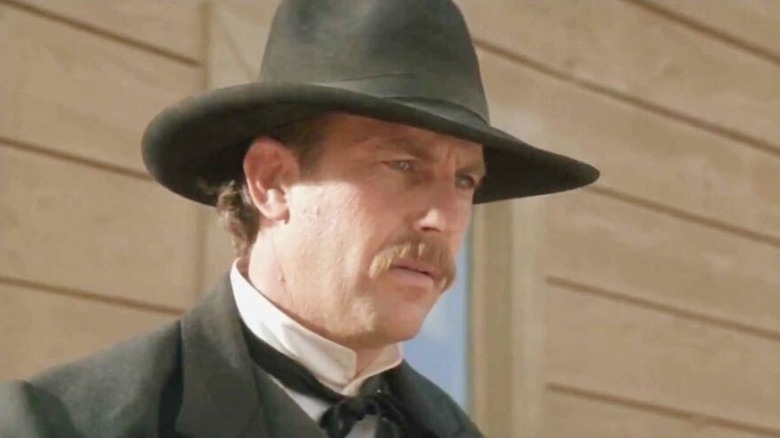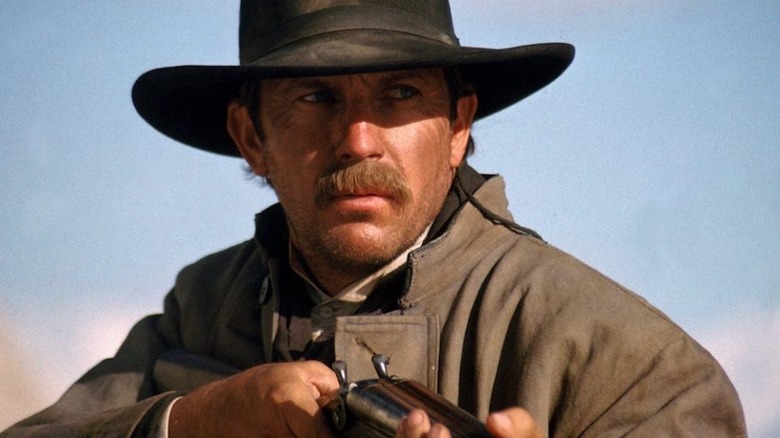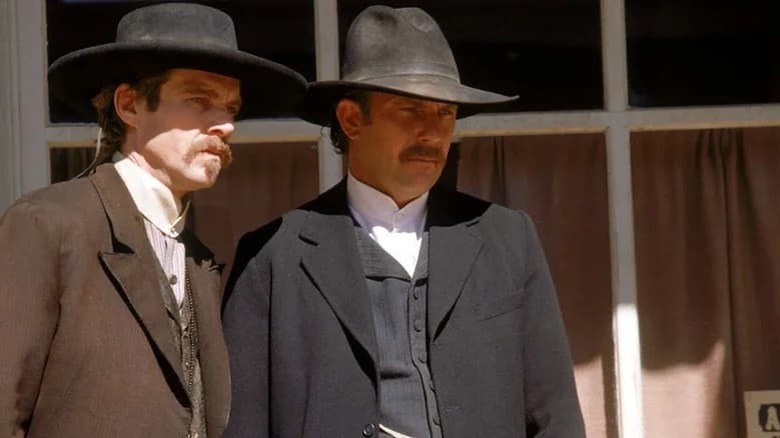How Wyatt Earp Went From A 6-Hour Mini-Series To A 3-Hour Epic
The origins of Lawrence Kasdan's "Wyatt Earp" rest within the troubled production of Kurt Russell's "Tombstone" (and "Tombstone" is Russell's movie, but we'll get to that). In the early 1990s, Kevin Costner, who was busily branding himself as an all-American hybrid of Gary Cooper and James Stewart, hooked up with "Glory" screenwriter Kevin Jarre to make "Tombstone," an epic film about the legendary, real-life lawman. This would've afforded the ambitious Costner a connection to another red-white-and-blue big-screen icon, Henry Fonda, who'd turned in what was then considered the definitive performance of Earp in John Ford's 1946 classic, "My Darling Clementine."
But Costner, who'd just won Oscars for Best Picture and Director with "Dances with Wolves," disapproved of Jarre's ensemble vision. He wanted his warts-and-all take on Earp to be the film's sole focus. When Jarre resisted, Costner bolted the project and pursued his own telling of Earp's tale.
Costner wisely took his Earp film to Kasdan, who had directed him in the entertaining 1985 Western, "Silverado," and he set his sights high. Along with his producing partner Jim Wilson, the star envisioned his take on Earp as a six-hour miniseries. In 2023, this would be a slam-dunk idea. In the '90s, however, television was beneath the director of "The Big Chill" and "The Accidental Tourist." So Kasdan, a true cinephile who adores Westerns, pitched Costner on a sweeping motion picture event.
Telling the unvarnished truth of a blandly varnished man
As Kevin Costner told the Christian Science Monitor in 1994, Lawrence Kasdan asked if he'd let him write a three-hour account of Earp's life. Costner owed his career to Kasdan in the strangest of ways — the director cut him out of "The Big Chill" but then wrote a scene-stealing role for him in "Silverado." It was a solid showcase that led to breakout roles in "The Untouchables" and "No Way Out." Because of this, Costner gave the four-time Oscar-nominated filmmaker all the leeway he needed.
Kasdan came back with a script that delivered the nuanced depiction of Earp that Costner desired. As he told the Christian Science Monitor:
"We didn't want Wyatt to be one-note; we exposed his dark side, his flaws. Early in the script, Gene Hackman, who plays Wyatt's father, drills into his four sons — 'Stick together, for there's nothing thicker than blood.' So when you see them walking shoulder to shoulder to the OK Corral, not knowing if they'll be dead in a few minutes, I wanted the audience to feel that family thing. To know there was someone walking next to you who would take a bullet for you."
When the facts are less entertaining than the legend, film the legend
When Kevin Costner and Lawrence Kasdan got "Wyatt Earp" greenlit at Warner Bros., the star played hardball via CAA superagent Mike Ovitz. In a 2006 interview with True West Magazine, Kurt Russell revealed that Costner and Ovitz killed prospects for "Tombstone" at every studio save for Disney, which wasn't the ideal home for a Western in 1993. Russell also clashed with Kevin Jarre on the direction of the movie, which led to the first-time helmer's firing. On the advice of his buddy Sylvester Stallone, Russell hired "Rambo: First Blood Part II" director George Pan Cosmatos to ghost the film through production. Cosmatos took the gig knowing that Russell wouldn't undercut him in the press. Russell wanted to finish the movie, but he didn't need the credit.
Thirty years later, Kasdan's "Wyatt Earp" is considered a star-driven folly, while Russell's "Tombstone" is a beloved Western classic. Neither movie can touch "My Darling Clementine," but "Tombstone" successfully blends the American action-film aesthetic with the traditional trappings of an unpretentious oater. "Wyatt Earp" wants to be more, but it has no idea where to go. If anything, it exposes Earp as a bore. He was integral to the taming of the West, but he wasn't all that interesting. You get a lot more mileage out of Henry Fonda leaning back on a chair outside of the marshal's office than the strenuous myth-building of Kasdan's movie.


